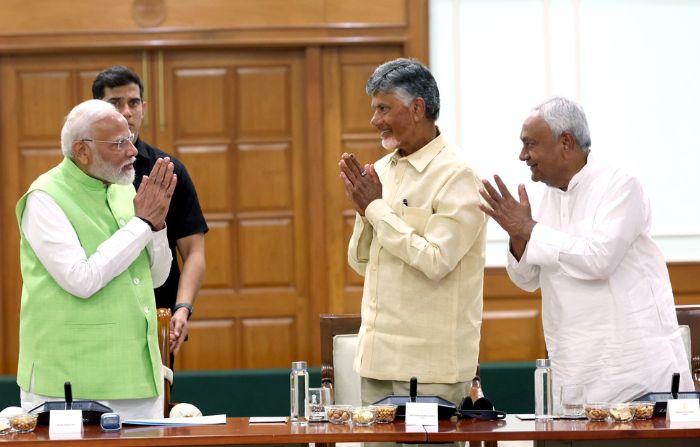- Thursday, April 03, 2025
Two key regional satraps — Nitish Kumar of the Janata Dal – United and N Chandrababu Naidu of the Telugu Desam Party — are learnt to have put forward their demands at a meeting of the NDA held on Wednesday (5),

By: Shubham Ghosh
INDIA’S ruling Bharatiya Janata Party (BJP) has failed to achieve a majority on its own in the recently held general elections, making it dependent on regional alliance partners to form the government. And already, some of those key parties of the National Democratic Alliance (NDA) have started bargaining to get top ministries in the third government led by prime minister Narendra Modi which is expected to take charge on Saturday (8).
Two key regional satraps — Nitish Kumar of the Janata Dal – United or JD(U) and N Chandrababu Naidu of the Telugu Desam Party (TDP) — are learnt to have put forward their demands at a meeting of the NDA held on Wednesday (5), a day after the election results were announced. There was no official word on their demands, but hectic negotiations were underway, reported NDTV.
Speculation is rife that the TDP, which has won 16 seats in the general elections and also swept the state elections in Andhra Pradesh in south India, has sought five ministerial berths, including the posts of the minister of state for finance and that of the speaker of the Lok Sabha or the Lower House of the parliament. The party may also be looking at ministries dealing with roads, panchayati raj (local governance), health and education, the report added.
Met our valued NDA partners. Ours is an alliance that will further national progress and fulfil regional aspirations. We will serve the 140 crore people of India and work towards building a Viksit Bharat. pic.twitter.com/ENo9b5ye4J
— Narendra Modi (@narendramodi) June 5, 2024
Read: Coalition era returns in Indian politics: Can Modi do a Vajpayee?
The JD(U), which has won 12 seats, is eyeing two cabinet posts and one of the minister of state, sources added. It might also look for the plum post of the railway minister, something its boss Nitish Kumar has held in the past when the NDA was in power. The eastern state of Bihar, which the JD(U) rules, will go to elections next year and Kumar’s party is expected to make the maximum gain at the federal government before that.
The JD(U) might even seek a common minimum programme (CMP) for the new NDA government as well as a coordination committee to monitor its implementation. The CMP is a resolution that outlines shared agenda of parties in a coalition. It was very much in practice when Atal Bihari Vajpayee was the prime minister with the late George Fernandes as its convenor at the time. Fernandes was in the JD(U) and this time, Kumar from the same party could don the mantle.
Read: Set for third term, Modi says will work with everyone for a developed India
A smaller ally from the southern state of Karnataka, Janata Dal (Secular), could also push for a ministerial role for its leader HD Kumaraswamy who won the seat of Mandya. The party of a former prime minister HD Deve Gowda, father of HD Kumaraswamy, is eyeing the agriculture ministry, it was speculated.
Shiv Sena led by Eknath Shinde, chief minister of the western state of Maharashtra; Lok Janshakti Party of Chirag Paswan from Bihar; Jana Sena Party of Pawan Kalyan in Andhra Pradesh are other allies that have won seats in this election and could also seek key roles in the third Modi government.
Modi’s Hindu nationalist party, which won majority on its own in the 2014 and 2019 general elections, finished with 240 seats in this year’s election, 32 short of the majority mark. The NDA ended up with 292 seats, thanks to the gains made by other parties in the alliance, including the TDP and JD(U).
The opposition Indian National Democratic Inclusive Alliance, which includes the main Indian National Congress, ended up with 232 seats.
Both alliances met in the capital on Thursday to chart out their future course of action.